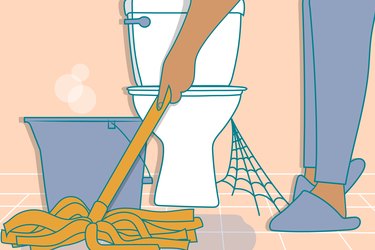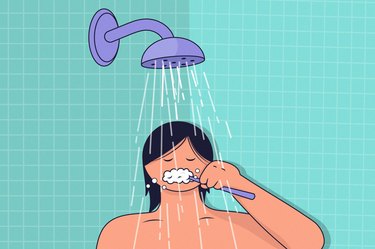
You likely don't think twice about tossing your socks, underwear or shirts into the wash after a single use, while pants, shorts or pajamas might get another wear or two.
But if you're like most people, you probably but your bathrobe back on the hook over and over (and over) before adding it to the dirty laundry pile.
Video of the Day
Video of the Day
That's a mistake, experts say.
Even if you're slipping on your robe after a shower or bath, you still need to wash it regularly to keep dirt, oils and odors from building up.
Here's how to tell how often is often enough, plus the best way to wash to make sure your robe really gets clean.
What Happens When You Never Wash Your Bathrobe?
Just like any other garment, bathrobes accumulate dirt, oil and buildup from your skin when you wear them. This gunk hangs out on the robe, then gets transferred back onto your skin the next time you put on the robe, explains Marisa Garshick, MD, assistant clinical professor of dermatology at Cornell-New York Presbyterian Medical Center.
That can set the stage for skin irritation or breakouts. (Hellooo, back acne!)
And similar to your worn T-shirt or socks, the buildup on your robe can start to take on an unpleasant odor and make you a little stinky.
"If you put something on that's dirty right after showering, it can defeat the purpose of the shower, which is to clean the skin," Dr. Garshick adds.
Wearing your robe while you're sick, or while you're caring for someone else who's sick? While it's unlikely, those germs can potentially make their way onto your fabric too — and they can stick around for a while. Respiratory viruses can last for days on clothing, and bugs that cause diarrhea can survive for weeks, according to environmental microbiologists at the University of Arizona.
In fact, bathrobes might be better breeding grounds for germs than other forms of clothing, because the bathrooms where they're stored tend to be warm and humid, says Teresa Hunsaker, a family consumer science educator with Utah State University Extension in Logan, Utah.
How Often to Wash Your Robe
Tend to use your robe like a towel — meaning, you wear it for a little while after hopping out of the shower or bath before getting dressed? Then it's probably fine to wash it about as often as you wash your towel. That's about every three to five uses, says the American Cleaning Institute.
If you wear your robe more often or for longer stretches (and especially if you sleep in it), you'll want to wash it more frequently, Hunsaker says. That's especially true if you have it on when you're cooking or eating, because food particles can make their way onto the robe's fabric.
And if you have it on all day when you or someone else in your household is sick? It's a good idea to toss it in the wash after just one wear, she suggests.
Washing your robe doesn't have to be complicated, by the way. You'll get all the germ-fighting, de-gunking power you need by tossing it into the regular wash cycle with cold water and running it through a standard dryer cycle, Hunsaker says. (No bleach or fabric softener required!)
But if using hot water makes you feel like you're getting a deeper clean, that's fine too.
So, How Bad Is It Really to Never Wash Your Bathrobe?
Not washing your robe is just as grimy as not washing your other clothes or towels.
Though you're more likely to experience potential skin irritation when you wear the dirty robe for long stretches, in general, not washing is "pretty bad," Dr. Garshick says.
So make a note to toss it in the laundry when you clean your towels and relish in that fresh, clean feeling.
Is this an emergency? If you are experiencing serious medical symptoms, please see the National Library of Medicine’s list of signs you need emergency medical attention or call 911.



